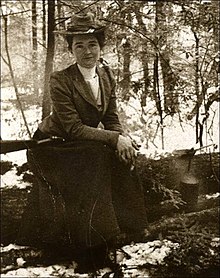Mina Benson Hubbard
| Mina Benson Hubbard | |
|---|---|

Mina Benson Hubbard, Labrador - Expedition in 1905
|
|
| Born | April 15, 1870 Bewdley, Ontario, Canada |
| Died | May 4, 1956 (aged 86) Coulsdon, United Kingdom |
| Nationality | Canadian |
| Occupation | explorer |
Mina Benson Hubbard (April 15, 1870 - May 4, 1956) was a Canadian explorer and was the first white woman to travel and explore the back-country of Labrador. The Nascaupee and George River system were first accurately mapped by her in 1905. She was the wife of Leonidas Hubbard who was famous for his ill-fated expedition to Labrador in 1903.
Mina Adelaine Benson was born on an apple farm near Bewdley, Ontario, Canada. Her father was James Benson, an Irish immigrant, and her mother was Jane Wood, from England. She was the seventh of eight children and received a primary education in the village school before teaching in Cobourg for two years.
After graduating as a nurse in 1899, from the Brooklyn Training School for Nurses, she went to work in a small hospital in Staten Island, New York. In 1900, she nursed the journalist Leonidas Hubbard whilst he was hospitalized with typhus. They married on 31 January 1901.
Following her husband's ill-fated expedition to Labrador in 1903, Hubbard asked a surviving member of the party, Dillon Wallace, to record the experience as a memorial to her husband. His published book, Lure of the Labrador Wild was a commercial success in America, but Hubbard was not satisfied, coming to believe that Wallace was responsible for the death of her husband, and that her husband's reputation had been blemished by Wallace's book.
In 1905, whilst Wallace was planning to mount a new expedition to complete the goal of 1903, Hubbard put together a team of her own to do the same thing in a bid to clear her husband's name. Consisting of the same George Elson who had been on the earlier expedition, along with two Cree Indians who had taken part in the unsuccessful rescue attempt in 1903, Hubbards team left Northwest River on June 27, the same day as the Wallace expedition. The press branded it a race and it received considerable attention in the news. The two parties never communicated before or during the expedition.
The 576 mile trip was an efficient, well organised trek through the Labrador wilderness, completed on schedule, despite weather delays at the beginning of August when they reached the watershed at Lake Michikamau. The expedition arrived at the George River post on Ungava Bay on 29 August, some seven weeks before Wallace.
...
Wikipedia
